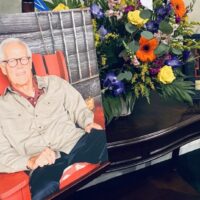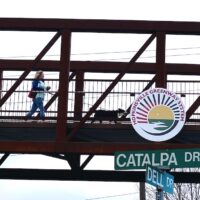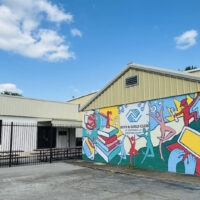This article first ran in The Sunday Brew newsletter. Get stories like this one delivered to your inbox by subscribing to Hoptown Chronicle’s newsletters.
There’s a special kind of commiserating that happens among strangers in the checkout at a grocery store. We approach a line that’s four or five customers deep and notice that the store has opened only one or two of its full-service lanes. Then we turn to the person who has just pulled in behind us, and it starts.
Me: “I guess they’re not going to open up any more registers.”
Stranger: “Doesn’t appear so.”
Me: “They want us to go down to the self-checkout.”
Stranger: “Not gonna do it.
Me: “Right? Soon enough they’ll have us out back of the store cutting our own ribeyes from a side of beef.”
OK. The steak joke is an exaggeration. But maybe you get my point. Every time I use a self-checkout, I feel like I’ve giving a business an excuse to employ fewer people. At least that’s part of my rational. The other thing is that I actually want to interact with people when I go into a store.
Grocery shoppers fall into two basic groups. There are the ones who want to get in and get out quickly, the less talking the better, and they will gladly scan their cartful of food at the self-checkout. Then there are those that want to place their five items on a conveyor belt so they can watch a store employee do the scanning while another employee does the bagging (as the universe intended).
There is a third sub-group of shoppers. They order their groceries through a phone app and have them delivered to the front door. Or they schedule a time for pickup at the store.
It’s hard to know what to make of the people in this group. Their method of filling the pantry greatly reduces the odds of human interaction — and that seems to be the point. But oddly enough, they are also a throwback to the days when small, local grocers delivered food to customers who kept a charge account with the store. I can appreciate that, and would happily engage with this type of commerce if only we had locally owned groceries again.
Several years ago I wrote a newspaper column about the large number of independent and chain grocery stores that dotted Hopkinsville’s landscape around the middle of the 20th century. A decade or so before I was around, there were dozens of groceries that operated at the same time and seemingly thrived in the local economy. Someone I interviewed said there was a grocery store or at least a small neighborhood market on nearly every block.
The thing that really surprised me about that story wasn’t the number of grocery stores, it was the number of people who contacted me after the column ran to tell me about all the stores they remembered. They left messages on my office phone. They emailed me. And they talked about long-gone stores like they were old friends that they still missed.
If this is sounding nostalgic, there’s a reason. It’s autumn. The leaves are gorgeous, but fading quickly. It does something to me every year.
All of this was prompted by an encounter with an older woman at Kroger around lunchtime Saturday. I had just placed my groceries on the conveyer belt when I took half a step back from my cart and planted my heel into her loafer. We had been talking about the lines, and I’m not sure why she stepped so close to me when my back was turned. I was immediately annoyed, and those pandemic concerns resurfaced. I wanted my space back.
My annoyance lasted about 30 seconds. As I paid and pushed off with my cart, my line companion was already chatting up the store clerk like they were old friends.
Those are my people, I thought. Waiting in line for a chance to talk to someone. And perhaps to save a job.
Jennifer P. Brown is co-founder, publisher and editor of Hoptown Chronicle. You can reach her at editor@hoptownchronicle.org. She spent 30 years as a reporter and editor at the Kentucky New Era. She is a co-chair of the national advisory board to the Institute for Rural Journalism and Community Issues, governing board president for the Kentucky Historical Society, and co-founder of the Kentucky Open Government Coalition.





